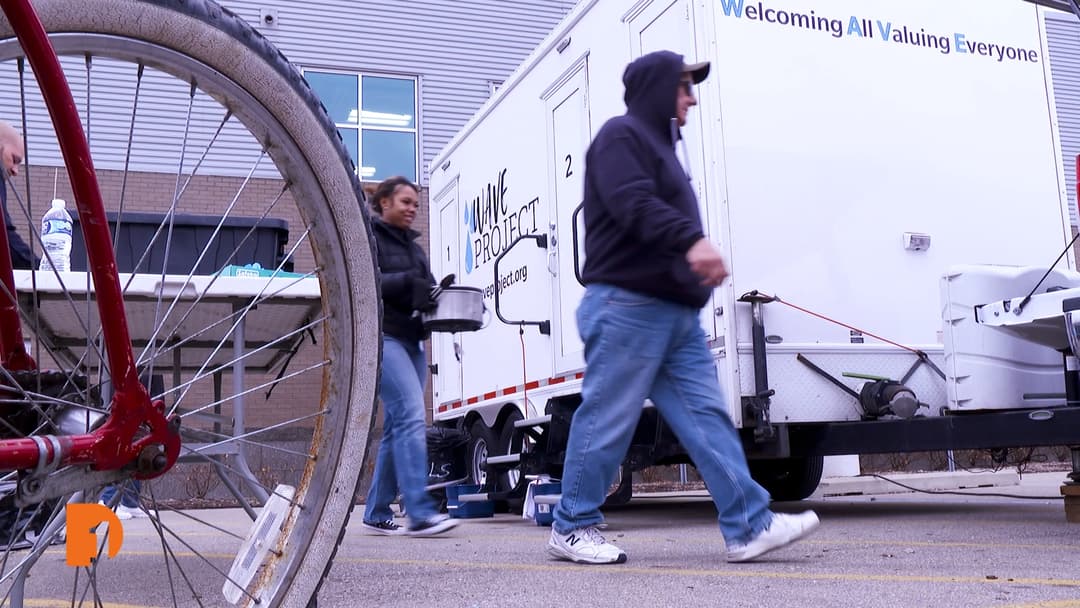The Children’s Center CEO, Higher education access, Detroit EV Mobility Program | American Black Journal
Nov 7, 2023
This Week on American Black Journal:
New CEO Nicole Wells Stallworth leads The Children’s Center into new era with focus on children’s mental health
Nicole Wells Stallworth has been selected as the new Chief Executive Officer of The Children’s Center, a long-standing nonprofit that has advocated for Detroit-area children and families since 1929. Stallworth began her new role on July 10. Former CEO Debora Matthews stayed with the company post-retirement to provide support in the changeover. She spent nearly two decades of her career with The Children’s Center.
The Children’s Center Board of Directors CEO Search Committee felt Wells Stallworth’s two decades of leadership experience in issues related to equity and quality of life made her the ideal choice after a year-long, nationwide search. Her diverse expertise in nonprofit management, advocacy, child welfare and more positions her to lead the center into a new era.
Stallworth previously served as the executive director of Planned Parenthood Advocates of Michigan. As she takes the reins of The Children’s Center, she plans to continue building upon the momentum and legacy of the organization with a focus on the stability, success, and growth of families in the region.
In a conversation with host Stephen Henderson, Wells Stallworth shared her vision for the organization, expressing her commitment to shaping better futures and life outcomes for the community. She talked about her focus on children’s mental and emotional health, particularly addressing the disruptions caused by the COVID-19 pandemic. Plus, she details The Children’s Center’s clinical services, which treat and help prevent behavioral, emotional, developmental and educational challenges in children and youth.
[et_pb_video src=”https://www.youtube.com/watch?v=LMEcze2NZn4″ admin_label=”Segment 1 Video” _builder_version=”4.23″ _module_preset=”default” global_colors_info=”{}”]
Michigan’s higher education experts discuss college access, equity for communities of color
A sobering reality persists for many students from communities of color trying to enter one of Michigan’s many higher education institutions. Often, they’re met with a myriad of challenges and barriers in the pursuit of college access and admission. From systemic inequities to financial constraints, these aspiring scholars often confront multifaceted hurdles that can hinder their dreams of post-secondary education.
In a high-impact panel discussion led by host Stephen Henderson, some of the state’s top experts in higher education diversity, equity, and inclusion including Fatima Salman, President of the National Association of Social Workers-MI; Kimberly Faison, Director of Community and Economic Development at Detroit Future City; and Onjila Odeneal, Senior Director of Policy and Advocacy at The Institute for College Access & Success (TICAS), came together to address the issues of college access and achievement for students of color in Michigan’s higher education system.
The panelists talk about how Michigan can improve outcomes for young students of color and what Michigan’s institutions of higher education must do to diversify their admissions and ensure first-generation students have the support they need.
[et_pb_video src=”https://www.youtube.com/watch?v=M83Z8Wf3gGs” admin_label=”Segment 2 Video” _builder_version=”4.23″ _module_preset=”default” global_colors_info=”{}”]
Blast Detroit’s EV Automotive Mobility Program prepares Detroiters for an electrified future
Blast Detroit has launched an innovative program, the EV Automotive Mobility Program, that equips Detroiters with the skills necessary for jobs that will soon be in high demand. The program offers hands-on training in the maintenance and repair of electric vehicles, as well as education in internal combustion engine technology, in an effort to bridge the gap and address the racial disparity within the electric vehicle (EV) industry.
Only roughly 2% of EV owners are Black, a statistic often attributed to vehicle costs and a notable lack of charging stations in predominantly Black neighborhoods, often referred to as “charging deserts.” The racial disparity within the EV industry is not just about car ownership; it extends to broader implications for public health and economic opportunities.
High asthma rates and air pollution have disproportionately affected Black Americans in zip codes where electric vehicle adoption has been slower due to a lack of infrastructure. Additionally, the lack of charging stations has hindered mobility and participation in the gig economy, especially in urban areas.
Ray Smith, the visionary behind the Deroit program, spoke with One Detroit Senior Producer Bill Kubota, to shed some light on the critical mission of the program and the skills students are being taught. Smith also talks about how he hopes the program will narrow the employment gap, improve health outcomes, and promote green job opportunities in communities of color.
[et_pb_video src=”https://www.youtube.com/watch?v=zoWJ_56VDgE” admin_label=”Segment 3 Video” _builder_version=”4.23″ _module_preset=”default” global_colors_info=”{}”]
Stay Connected:
Subscribe to Detroit PBS YouTube Channel & Don’t miss American Black Journal on Tuesday at 7:30 p.m and Sunday at 9:30 a.m. on Detroit PBS, WTVS-Channel 56.
Catch the daily conversations on our website, Facebook, Twitter and Instagram @amblackjournal.
View Past Episodes >
Watch American Black Journal on Tuesday at 7:30 p.m. and Sunday at 9:30 a.m. on Detroit Public TV, WTVS-Channel 56.
Stay Connected
Subscribe to Detroit PBS YouTube Channel & Don’t miss American Black Journal on Tuesday at 7:30 p.m. and Sunday at 9:30 a.m. on Detroit PBS, WTVS-Channel 56.
Catch the daily conversations on our website, Facebook, Twitter, and Instagram @amblackjournal.
Related Posts
Leave a Reply
Your email address will not be published. Required fields are marked*


























